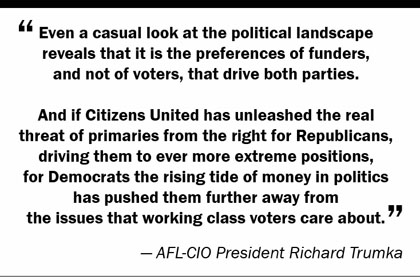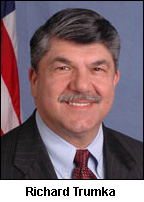OPINION
America’s progressive populist agenda ‘submerged’ in D.C.
By RICHARD TRUMKA
(Sept. 26, 2014) — In reality, the 2014 election is about the economic well-being of working class Americans. But you wouldn’t know it from pundits, or the avalanche of TV ads.
 Recently the New York Times reported that in the last 10 years, the net worth of the typical U.S. household fell 36 percent while the net worth of households in the top 10 percent of the income structure rose by 14 percent. Three quarters of those who make the median income or less report that they cannot make ends meet.
Recently the New York Times reported that in the last 10 years, the net worth of the typical U.S. household fell 36 percent while the net worth of households in the top 10 percent of the income structure rose by 14 percent. Three quarters of those who make the median income or less report that they cannot make ends meet.
So it shouldn’t surprise anyone that in America in 2014, populism decides who wins elections. The only question is which kind of populism is going to win.
There is a radical right-wing populism that points its finger at government, at the president, at ObamaCare, at immigrants, and at the so called “takers.” It’s a diversionary populism that channels anger over the fundamental reality in America since the 1970’s — there’s an economic crisis underway for working Americans. And it’s not surprising that right-wing populism is diversionary — if you look at its funders you find the economic elites its rank-and-file despise.
Progressive populism is something very different. Progressive populists seek to address the economic realities of 2014 directly by advocating policies that would create jobs and drive up wages — making the society fairer and creating opportunities for those who work hard. Progressive populists favor what I like to call the submerged majoritarian agenda — the economic agenda a majority of Americans strongly support but that can’t get any traction in Washington, D.C.
What is this submerged agenda?
It’s policies that make our country fairer right now — like increasing the minimum wage, restoring workers ability to bargain with employers, and taxing millionaires and giant corporations at levels that reflect how much of the country’s wealth and income they now have.
It’s policies that challenge the failed bi-partisan neoliberal consensus of the last 30 years — like ending NAFTA-style trade agreements, restoring a 21st century Glass-Steagall that separates old-fashioned banking from old-fashioned gambling, and relief for students starting adult life as debt peons.
 And it’s policies that lay the groundwork for future prosperity by investing in our country — in our infrastructure, in our schools, and in our workforce.
And it’s policies that lay the groundwork for future prosperity by investing in our country — in our infrastructure, in our schools, and in our workforce.
And finally it’s policies that do all these things, and that are moral necessities — like comprehensive immigration reform and ending mass incarceration.
Why is this popular agenda submerged? Even a casual look at the political landscape reveals that it is the preferences of funders, and not of voters, that drive both parties. And if Citizens United has unleashed the real threat of primaries from the right for Republicans, driving them to ever more extreme positions, for Democrats the rising tide of money in politics has pushed them further away from the issues that working class voters care about.
The result of politicians trying to hide from the economic reality of falling wages is voters’ despair of public life offering solutions. Progressive populist candidates that stand with working-class voters on economic issues have an enormous advantage, but still have to contend with the deep cynicism over government and the rules of the economic game. Because the circumstances that give rise to this populist moment are also the circumstances that lead many voters to conclude nothing can be done.
Income inequality is having “a moment” in popular conversation — a conversation that is sadly 30-40 years in the making. But to the extent that inequality has entered the political discussion, it’s been as a policy “issue,” ironically discussed in elite settings in ways that promote fatalism and a sense of inevitability. Yet if there’s one thing history should teach us is that the argument that “things just have to be this way” is always wrong.
And if you wanted evidence that shows that we don’t have to settle for a choice between radical right-wing populism and elite complacency, you need look no farther than the real world of American politics. Here’s an interesting finding from one of the AFL-CIO’s recent polls, a finding that illustrates a chasm in our politics on the basis of class.
When asked whether they agreed with the statement, “We need to make sure that all of us, not just the CEO’s get their fair share in our economy,” 66 percent of those making less than $50,000 agreed, while only 26 percent of those making more agreed.
The kicker — that polling is among Republicans. That’s right, two thirds of Republicans making less than $50,000 a year believe in the basic populist critique of our economy. And that’s not an outlier — down the line, Republicans, and certainly independents, who make less than $50,000 look a lot like progressive populists.
I’ve heard the same thing from talking with working people at hundreds of union halls and thousands of kitchen tables over the last few years. When I talk to the people who elect me, I don’t ask them if they are Democrats or Republicans, I ask them how things are going for their families. I know that union members belong to both parties, yet I rarely hear much difference in the anger, the bitterness, about what has happened to them in what is supposed to be a country that rewards hard, productive work.
So everything I know — the economic data, the polls, my personal experience — tells me that if the 2014 election offers voters clear differences on class, the result would look very different than the outcomes DC’s chattering classes are currently prognosticating. Why?
 Even though it’s rarely spoken of in polite company, people vote by class. An easy and powerful distinction is to look at voters who make less than the median wage and compare their views to those who make more than the median wage. According to the exit polls, voters who make more than $50,000 elected Mitt Romney president, 53-45. And that’s a consistent pattern — 55 percent voted for Republicans in 2010, and 52 percent are voting for them now.
Even though it’s rarely spoken of in polite company, people vote by class. An easy and powerful distinction is to look at voters who make less than the median wage and compare their views to those who make more than the median wage. According to the exit polls, voters who make more than $50,000 elected Mitt Romney president, 53-45. And that’s a consistent pattern — 55 percent voted for Republicans in 2010, and 52 percent are voting for them now.
On the other hand, Democrats win those making less than $50,000. Always. What decides elections is the margin by which Democrats win working-class voters. In 2006, 2008 and 2012 it was 22 points, and in each of those cycles Democrats made gains in the House and Senate, as well as winning the presidency twice.
In 2010, the Democratic win margin among working class voters was only 11 percent — and, additionally, those voters declined as a share of the electorate by 4 points. Those declines were enough to turn the election into a Republican tsunami.
Remarkably, that’s what we may see again, as too many Democratic candidates turn away from the relatively clear message of the 2012 elections and back toward the muddled moderation that they embraced in 2010 to such disastrous effect.
This is consistent with the seemingly serial bad news Democrats have been receiving about Millenials, Latinos, African Americans and unmarried women. Consistent AND provides an explanation. Three quarters of those making less than $50,000 say they’re falling behind. And they’ve become more cynical about what politicians can do to remedy their plight. No wonder they’re less interested in voting.
Americans identify as working class more than at any time in my lifetime. And workers don’t want to hear about inequality as though it were a regrettable natural disaster — we want to hear what’s going to make our lives better. Working people yearn for a politics that will actually address how we can earn more so that they can keep up with the cost of living, how our children can pay their student debts, how we can afford retirement.
 This environment offers a huge opening for progressive populists. The Republicans who are offering radical right-wing populism generally score terribly with working class voters on concern about “people like you.” Democratic candidates have to choose — they can anger a few donors by making a convincing, concrete case that they will deliver a better life to the working-class voters. They can do this by lifting up the submerged majority agenda of progressive populism.
This environment offers a huge opening for progressive populists. The Republicans who are offering radical right-wing populism generally score terribly with working class voters on concern about “people like you.” Democratic candidates have to choose — they can anger a few donors by making a convincing, concrete case that they will deliver a better life to the working-class voters. They can do this by lifting up the submerged majority agenda of progressive populism.
Or they can lose.
Richard Trumka is President of the AFL-CIO. This column originally appeared in The Hill. Learn more at aflcio.org.





